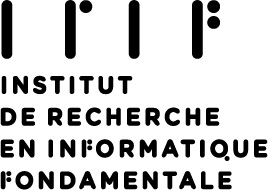
Site Entries:On this page :


- TITLE: Polymorphic records in dynamic languages
- References
- Contacts



Post-doc project description
TITLE: Polymorphic records in dynamic languages
This project is proposed in collaboration with and partially financed by Dashbit  .
.
Duration: 14 months or more
Context
Elixir
 is a dynamic functional programming language that runs on the Erlang Virtual Machine [1]. The language has been gaining adoption over the last years in areas such as web applications, embedded systems, data processing, distributed systems, and more. It is used by companies such as PagerDuty, Discord, and Pinterest.
is a dynamic functional programming language that runs on the Erlang Virtual Machine [1]. The language has been gaining adoption over the last years in areas such as web applications, embedded systems, data processing, distributed systems, and more. It is used by companies such as PagerDuty, Discord, and Pinterest.
The Research Institute on the Foundations of Computer Science (IRIF) in Paris has started a collaboration with Dashbit and José Valim, the author of Elixir, to define and implement a type system for the language. The system we are devising is a polymorphic type system featuring union and intersection types [2], occurrence typing [3], and gradual typing [4]. Record types play an important role in Elixir and, more generally, in dynamic languages. The goal of this post-doc position is to develop the polymorphic typing of Elixir records and possibly contribute to its implementation in the Elixir type checker.
Goals
The type system for the functional core of Elixir is being studied and developed in a PhD thesis jointly supervised by Giuseppe Castagna (IRIF) and José Valim (Dashbit) based on semantic subtyping and set-theoretic types [5]:
- Union and intersections types that characterize semantic subtyping are the right tools for typing key aspects of the Elixir language: intersection types are needed for a fine-grained typing of overloaded functions, while pattern-matching and guards require union and negation types [6]. [1]
- To capture some programming patterns used in Elixir, one needs to resort to the techniques of gradual typing, parametric polymorphism, and occurrence typing, three tools whose theoretical aspects have already been studied for semantic subtyping [3,7,4]
References
- [1] The Elixir Programming Language

- [2] Giuseppe Castagna: Programming with union, intersection, and negation types
 , November, 2021. Unpublished manuscript (arXiv:2111.03354).
, November, 2021. Unpublished manuscript (arXiv:2111.03354). - [3] Giuseppe Castagna, Mickaël Laurent, Kim Nguyen, and Matthew Lutze: On Type-Cases, Union Elimination, and Occurrence Typing
 . Proc. ACM Program. Lang., vol. 6, n. POPL, January, 2022.
. Proc. ACM Program. Lang., vol. 6, n. POPL, January, 2022. - [4] Giuseppe Castagna, Victor Lanvin, Tommaso Petrucciani, and Jeremy G. Siek: Gradual Typing: a New Perspective
 . Proc. ACM Program. Lang., vol. 3, Article 16, n. POPL '19: 46th ACM Symposium on Principles of Programming Languages, January, 2019.
. Proc. ACM Program. Lang., vol. 3, Article 16, n. POPL '19: 46th ACM Symposium on Principles of Programming Languages, January, 2019. - [5] G. Castagna and A. Frisch: A gentle introduction to semantic subtyping
 . In Proceedings of PPDP '05, the 7th ACM SIGPLAN International Symposium on Principles and Practice of Declarative Programming, pages 198-208, ACM Press (full version) and ICALP '05, 32nd International Colloquium on Automata, Languages and Programming, Lecture Notes in Computer Science n. 3580, pages 30-34, Springer (summary), July, 2005. Joint ICALP-PPDP keynote talk.
. In Proceedings of PPDP '05, the 7th ACM SIGPLAN International Symposium on Principles and Practice of Declarative Programming, pages 198-208, ACM Press (full version) and ICALP '05, 32nd International Colloquium on Automata, Languages and Programming, Lecture Notes in Computer Science n. 3580, pages 30-34, Springer (summary), July, 2005. Joint ICALP-PPDP keynote talk. - [6] G. Castagna: Covariance and Contravariance: a fresh look at an old issue (a primer in advanced type systems for learning functional programmers)
 . Logical Methods in Computer Science, n. 16, pag. 15:1―15:58, 2020.
. Logical Methods in Computer Science, n. 16, pag. 15:1―15:58, 2020. - [7] Tommaso Petrucciani. Polymorphic set-theoretic types for functional languages
 . Joint PhD thesis. Università di Genova; Université Sorbonne Paris Cité – Université Paris Diderot, 2019.
. Joint PhD thesis. Università di Genova; Université Sorbonne Paris Cité – Université Paris Diderot, 2019.
- [8] Alain Frisch: Théorie, conception et réalisation d’un langage de programmation adapté à XML
 . PhD thesis, Université Paris 7 – Denis Diderot, 2004.
. PhD thesis, Université Paris 7 – Denis Diderot, 2004. - [9] Didier Rémy: Type checking records and variants in a natural extension of ML
 . POPL '89: Proceedings of the 16th ACM SIGPLAN-SIGACT symposium on Principles of programming languages, January 1989
. POPL '89: Proceedings of the 16th ACM SIGPLAN-SIGACT symposium on Principles of programming languages, January 1989 - [10]François Pottier:
A versatile constraint-based type inference system
 Nordic Journal of Computing, Volume 7, Issue 4, Winter 2000 pp 312–347
Nordic Journal of Computing, Volume 7, Issue 4, Winter 2000 pp 312–347
- [11] Tommaso Petrucciani: Polymorphic set-theoretic types for functional languages
 . Joint PhD thesis. Università di Genova; Université Sorbonne Paris Cité – Université Paris Diderot, 2019.
. Joint PhD thesis. Università di Genova; Université Sorbonne Paris Cité – Université Paris Diderot, 2019.
Contacts
- Giuseppe Castagna
 : IRIF, Research Institute on the Foundations of Computer Science, Université Paris Cité.
: IRIF, Research Institute on the Foundations of Computer Science, Université Paris Cité.
- José Valim
 : Dashbit.
: Dashbit.
[1] As an example, the overloaded sum function has type (Int×Int → Int)∩(Real×Real → Real)∩ ...(read the intersection ∩ as “and"); in pattern matching, a variable that captures the expression matched by some pattern does not have the type captured by previous patterns (i.e. it has a negation type) and the whole matching expression has the union of the types of all branches of the pattern matching.
|
|



